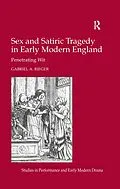Drawing upon recent scholarship in Renaissance studies regarding notions of the body, political, physical and social, this study examines how the satiric tragedians of the English Renaissance employ the languages of sex - including sexual slander, titillation, insinuation and obscenity - in the service of satiric aggression. There is a close association between the genre of satire and sexually descriptive language in the period, author Gabriel Rieger argues, particularly in the ways in which both the genre and the languages embody systems of oppositions. In exploring the various purposes which sexually descriptive language serves for the satiric tragedian, Rieger reviews a broad range of texts, ancient, Renaissance, and contemporary, by satiric tragedians, moralists, medical writers and critics, paying particular attention to the works of William Shakespeare, Thomas Middleton and John Webster
Autorentext
Gabriel A. Rieger is an assistant professor of medieval and Renaissance literature at Concord University in Athens, West Virginia, where he lives with his wife and daughter
Inhalt
Contents: Introduction: sex, stoicism and satyre: the roots of satiric tragedy; 'You go not till I set you up a glass': the death of Elizabeth and the languages of gender; 'Deep ruts and fouls sloughs': sexually descriptive language and the narrative of disease; 'I'll have my will': frustrated desire and commercial culture; 'I am worth no worse a place': service, subjugation and satire; Conclusion: erotic aggression and satiric tragedy; Appendix; Works cited, Index.
